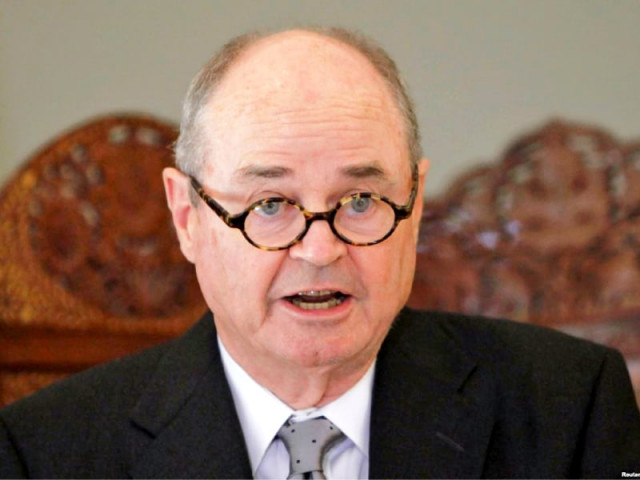Pakistan, US to revive Afghan peace efforts
Dobbins met army chief Gen Raheel Sharif to discuss defence cooperation between the two countries.

During the meeting with the PM, James Dobbins said that Islamabad and Washington had ‘convergences’ on the issue of Afghanistan, a source said. PHOTO: FILE
The issue came under discussion during a series of meetings between the US special representative for Pakistan and Afghanistan, James Dobbins, and top Pakistani officials.
Before concluding his two-day trip on Friday, Dobbins met with Prime Minister Nawaz Sharif and army chief General Raheel Sharif. A day earlier he had met with Prime Minister’s Adviser on National Security and Foreign Affairs Sartaj Aziz and Interior Minister Chaudhry Nisar Ali Khan.
According to officials, the discussions focused on evolving a strategy to revive the stalled peace process in Afghanistan. Washington is keen on striking some kind of a deal with the Taliban and other Afghan insurgents before the US-led forces withdraw by end of this year.
Officials added that both sides would seek an early meeting of the trilateral group, comprising senior officials from Pakistan, Afghanistan and the US, to discuss the reconciliation efforts.
During the meeting with the PM, President Obama’s point-man for the region said that Islamabad and Washington had ‘convergences’ on the issue of Afghanistan, a source said.
According to the official statement, both sides discussed matters of mutual interests, regional security situation, US drawdown and reconciliation process in Afghanistan.
Finance Minister Ishaq Dar and US Ambassador Richard Olson also attended the meeting.
Separately, Dobbins met army chief Gen Raheel Sharif to discuss defence cooperation between the two countries as well as the current regional security situation.
Sources said the issue of transfer of some of the leftover military equipment of the US forces stationed in Afghanistan to Pakistani army also came under discussion.
Pakistan is particularly interested in the US army’s mine-resistant ambush-protected (MRAP) vehicles, which Pentagon officials say will have limited strategic value as US forces withdraw from Afghanistan.
But with Pakistan’s military expected to be battling Taliban insurgents for years, the MRAPs could help them slow their high casualty rate – more than 20,000 dead or injured troops since 2001.
According to a statement issued by the US Embassy, Dobbins appreciated the opportunity to meet with the Pakistani leadership.
He reaffirmed the US commitment to enhancing its relations with Pakistan, discussed opportunities for bilateral coordination to promote regional stability, and explored ways for the US and Pakistan may forge a stronger partnership by working together to achieve common objectives, the statement said.
Published in The Express Tribune, April 26th, 2014.



















COMMENTS
Comments are moderated and generally will be posted if they are on-topic and not abusive.
For more information, please see our Comments FAQ